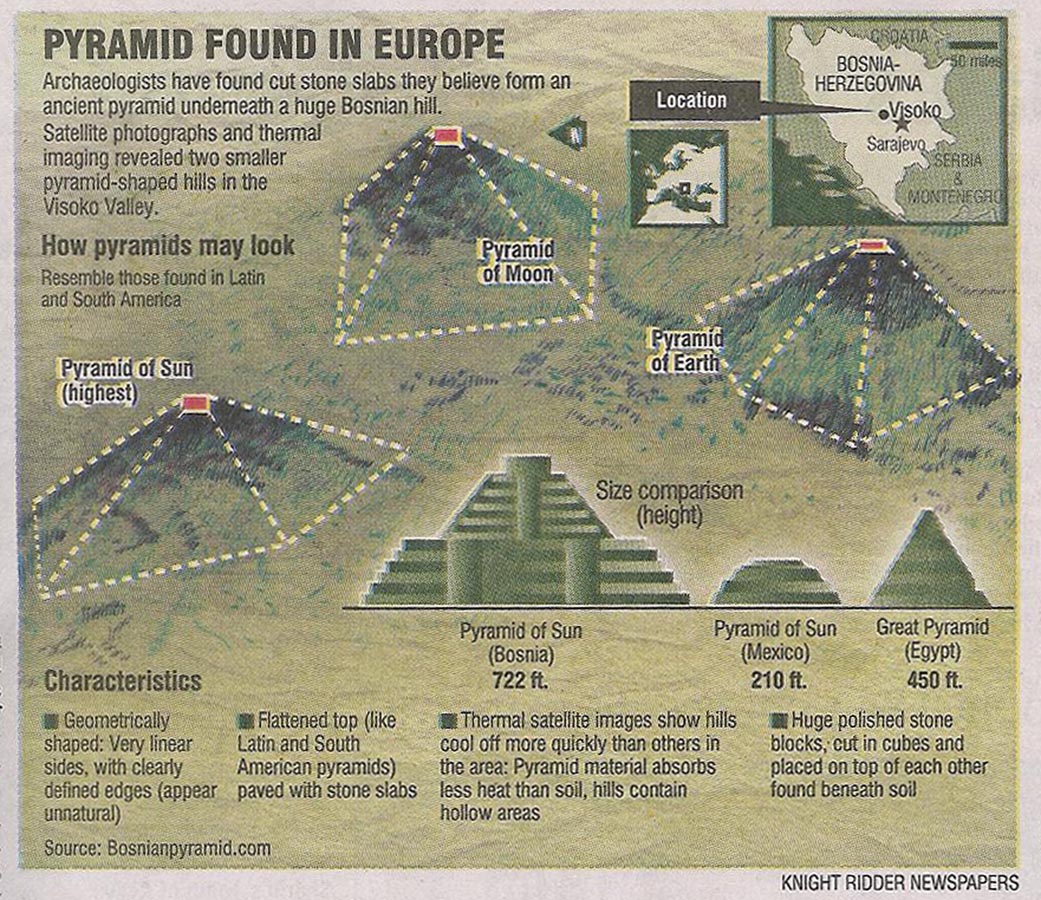
photo from: http://www.mwm.cz/mwm/image03/1211-11.jpg

photo from: http://www.mwm.cz/mwm/image03/1211-11.jpg







 |
|
Amel Emric / AP
Amateur archaeologist Semir Osmanagic, rear right, points to the geometrically cut stone blocks at the excavation on Visocica Hill on Wednesday. |
|
Scientists begin dig at Bosnian pyramid
Updated: 8:00 a.m. ET April 20, 2006 VISOKO, Bosnia-Herzegovina -
Researchers in Bosnia on Wednesday unearthed the first solid evidence that an Archaeologists and other experts
began digging into the sides of the mysterious hill near the central Bosnian
town of "These are the first uncovered
walls of the pyramid," said Semir Osmanagic, a Bosnian archaeologist who studied Osmanagic said Wednesday's
discovery significantly bolsters his theory that the 2,120-foot hill rising
above the small "We can see the surface is perfectly flat. This is the crucial material proof that we are talking pyramids," he said. Osmanagic believes the structure
itself is a colossal 722 feet high, or a third taller than Egypt's Great Pyramid
of "It is so obvious that the top of
the blocks, the surface is man made," Osmanagic said. He plans to continue
the work Earlier research on the hill,
known as Visocica, found that it has perfectly shaped, 45-degree slopes pointing
toward Satellite photographs and thermal imaging revealed two other, smaller pyramid-shaped hills in the Visoko Valley. Last week's excavations began with
a team of rescue workers from a nearby coal mine being sent into a tunnel They were followed by
archeologists, geologists and other experts who emerged from the tunnel later to
declare that The work will continue for about
six months at the site just outside Visoko, about 20 miles northwest of the
capital, "It will be a very exciting archaeological spring and summer," Osmanagic said. Copyright 2006 The Associated Press. All rights
reserved.
|
Australian archaeologist Royce Richards is among a team preparing to look for
the truth behind a theory that Bosnia-
Herzegovina has an ancient pyramid.
Archaeologists from Australia, Scotland, Ireland, Austria, and Slovenia will
begin excavation work in April on the
Visocica hill, 32 kilometres north-west of
Sarajevo.
The hill is quite symmetrical, and the theory that it was once a pyramid is supported by preliminary investigations.
If true, it would rewrite world history, putting Europe alongside South
America and of course Egypt as homes of ancient
pyramids.
Bosnian Semir Osmanagic put forward his theory last year that a 100 metre
geometrically-shaped hill with evenly shaped
sides and corners that point north,
south, east and west is an ancient man-made edifice.
Osmanagic, who has spent 15 years studying the pyramids of the Americas is
convinced the hill is a genuine man-made
pyramid from an ancient civilization.
His preliminary excavations shows what he believes is evidence that the earth
has been shaped to form a pyramid and
covered in prehistoric concrete and stone
blocks.
"We have already dug out stone blocks which I believe are covering the pyramid," Osmanagic said.
"We found a paved entrance plateau and discovered underground tunnels.
"You don't have to be an expert to realise what this is."
Osmanagic's assertions have been supported by experts studying aerial and satellite images.
Theorists believe the Illyrian people who inhabited the Balkan region before
the conquering Slavic tribes overran them
about 1,400 years ago had the
sophistication to shape a hill into a pyramid.
Excavation work to test Osmanagic's theory will begin on April 14 in the
Visoko region and is expected to continue until
October and the rugged
mountainous area has become an archaeological park.
© 2006 AAP
Near the city of Visoko, 30 km north of Sarajevo, there is a stone pyramid of
monumental size, claims the Bosnian
archeologist Semir Osmanagić, who lives and
works in the USA.
After several months of geological and archeological research, Mr. Osmanagić
concluded that under the present hill of
Visočica hides a stairs-like pyramid,
about 12,000 years old. Osmanagić, who intensively researched on pyramids in
Americas, Asia and Africa for the last 15 years and wrote several books on the
subject, says he’s quite sure he found
the first pyramid in Europe, which is
quite similar to ones in the Southern America.
He believes that the project would completely change Bosnia’s significance in the world of archeology.
On the top of “Bosnian pyramid of Sun” was a temple, built by
pre-Illyrians, people who lived, according to Osmanagić,
27,000 years ago.
Mr. Osmanagić thinks he will solve the “Bosnian pyramid of Sun” in the
next five years, but also prove the existence
of “Bosnian pyramid of Moon”,
lying under the neighboring hill of Križ.
According to BBC, the leading Bosnian newspaper “Dnevni Avaz” writes:
“The pyramid is 100 metres high and there is evidence that it contains rooms and a monumental causeway …
The plateau is built of stone blocks, which indicates the presence at the time of a highly developed civilisation,”
the daily explains.“Archaeological excavations near the surface have uncovered a part of a wall and fragments of steps,” it reveals.
“Visocica hill could not have been shaped like this by nature,” geologist Nada Nukic tells the daily. “This is already
far too more than we have anticipated, but we expect a lot more from further analysis,” she concludes.
Watch Reuters TV-report at Politiken.
